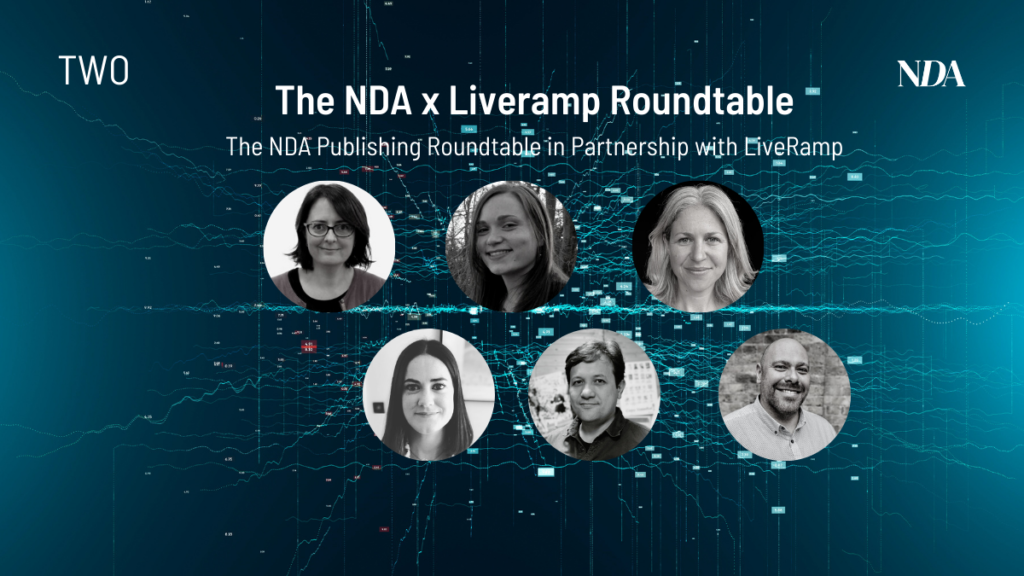NDA recently partnered with LiveRamp to hold a roundtable looking at the deprecation of third-party cookies from the point of view of the publisher. The roundtable featured insights from Jo Holdaway, Chief Data & Marketing Officer at Independent Digital News and Media; Eleanor Marshall, Commercial Data Director at Global; Sherzod Rizaev, Vice President of Commercial Operations at Minute Media; Jane Brady, Head of Brand Partnerships at Mumsnet; Sarah Lavery, Global Programmatic & Operations Director at IDG; and LiveRamp’s Head of Publishers, UK, Ryan Afshar.
With third-party cookies going away, the industry has been working hard to find ways that it can continue to be effective in a world without easy access to consumer data. For publishers, there are a number of strategies that they could potentially be adopting, one of which focuses on authenticated first-party data.
“LiveRamp really believes that the future success of publishers lies within their authenticated first-party data strategies. And that’s something we’ve been working very closely with the industry on over the last two years,” said LiveRamp’s Afshar.
“Also, we’ve seen that brands want to have more direct contact with publishers, and they are really leaning into the various ID solutions. And, actually, they’re willing to pay more for inventory that is based on authenticated traffic and data. So, this is really encouraging for the publisher community.”
Approaches to authentication
At The Independent, there has been a focus on first-party data collection, with the aim of getting three million users registered by April next year – and the publisher is on track to surpass that goal.
“What we’re trying to do is up registrations, make the value exchange really clear to our readers, let our readers know that the quality of our readership means that there should be a value exchange of some kind. They can either get access to our premium content, they can sign up to newsletters, they can attend events, they can join our community of commenters, they can join our ask-me-anythings or Q&As etc. We’ve got a whole host of value exchanges,” said The Independent’s Holdaway.
“We’ve done testing and learning with registration gating. So, to access any of our content, we have an in-line registration gate. It’s a soft gate, and it’s very respectful to our readers. And we’ve seen, pre-registration gating, an over 700% increase in registrations, and it’s been phenomenally successful for us. But what we want, most of all, is for those to be engaged readers that log in regularly.”
Similarly, radio company Global rolled out a sign in gate across all of its apps within the Global Player at the beginning of the year. The focus for Global, according to Marshall, is on “balancing the data capture with not making it too cumbersome to the listener and not asking any more than is necessary at the point of registration”.
Within Global’s experience, registration unlocks recommendations, the ability to favourite things, playlists, and content-related activities. This value exchange is highlighted within the sign in gate.
“It’s also led to a lot more discovery across our apps. Global, obviously, owns a lot of digital stations. At first glance, you might not realise that Heart and LBC actually fall under the same umbrella. But there’s been real value in combining them into one overall app, and then enabling some cross pollination between the different brands, but also having more curated content,” explained Marshall.
“Where we’re thinking of next is how to get more data beyond what we can purely capture from music listening. But again, it’s about how we balance asking that from our audiences and is something that fits nicely with the user experience, has little impact, and that’s on brand as well. That’s where we’ll be testing and learning.”
Approaching things a little differently
On the other side of the coin, there are publishers like IDG and Minute Media where things aren’t perhaps as straightforward.
IDG has B2B and B2C sides to its business. On the B2B side, its ‘Insider’ programme has been running for a long time and it sees the majority of its revenues off-site, through either lead generation, events, or custom content. On the consumer side, IDG finds things a little bit more difficult.
“We’re a tech publisher answering specific questions for people looking to understand their choices or their problems and looking to buy. So, there’s a big affiliate focus in our business,” said IDG’s Lavery. “There’s a sensitivity around interrupting that workflow with loads of pop ups asking for logins and what have you. And there’s the reality of our traffic composition, which is often driven by search. As a result, you don’t necessarily get that repeat visitor within 30 days or whatever it may be.”
In order to solve this issue, IDG is revamping its newsletter and login strategy, which has seen the publisher bring in a CDP to test and deploy those.
“We need to see the value in those returning users. The objective is to ascertain that value. We need to know exactly what the value of that user is versus an anonymous user. And, if we can build out a business case and understand the value, we’ll invest accordingly,” Lavery added.
Over at Minute Media, there are similar issues. Within its entertainment categories, there are “millions of very loyal users with hundreds of thousands of email addresses and login details”, according to Rizaev. But, on the other hand, there are brands like 90min, where most of the users are “not particularly long tail”.
“They come to the site from aggregated social media networks like Facebook, Twitter, Instagram, whatever it might be. So, it’s a very different strategy when it comes to the authentication of our users,” Rizaev explained. “We are working with some of our ad tech partners to see the repetitiveness of the users and how long they visit, then they look at where else they are visiting, and which entry points that they’re giving their details.”
And then there are publishers like Mumsnet, where the forum-based nature of the website means that they already hold quite a bit of information about its visitors. Already holding this authenticated first-party data means that it’s able to focus in different areas in preparation for the deprecation of Chrome’s third-party cookies.
“We’re in a pretty good position at Mumsnet, in that we have a certain amount of data about our users, so we’re not actually looking to find out more about them,” said Brady. “What we want to make sure we do is put their privacy ahead of what we’re trying to do from a commercial perspective.”
It’s important to note that, whatever the authentication strategy, publishers need to make it clear to their users what the value exchange is. Additionally, publishers should never seek to get all of their users authenticated, because it’s simply not possible.
“You only have to look at what’s been happening with TV broadcasters over the last five years. They’ve really done a good job of articulating to their customers that if you register with them, you’ll get access to free content, recommendation engines etc.,” said Afshar.
“When we talk about authentications, we’re never really looking at 100%. In fact, if a publisher can have 30% of their traffic authenticated, we see that as a real success story. The Google delay means that publishers have time to grow that authentication base in a meaningful way, slowly, but doing it in a way that is not intrusive, not going to annoy their users, and doing it organically,” he concluded.












